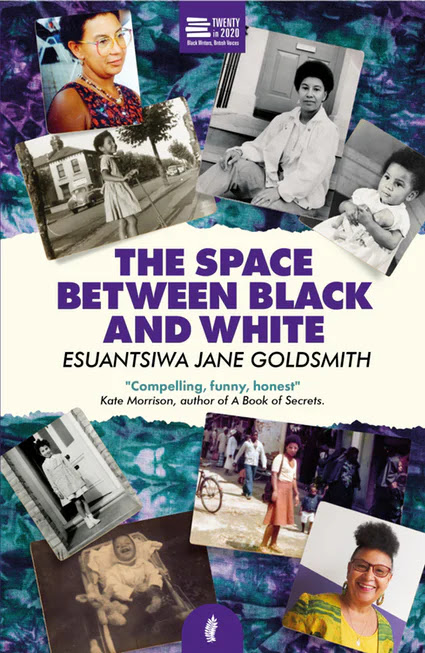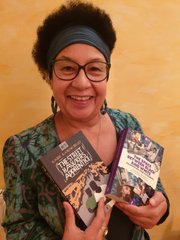I joined WUS as student campaigns officer in the autumn of 1980. It was my dream job, all my experience and passions rolled into one – student activism, refugee solidarity, internationalism, and women’s rights. I had just returned from VSO, teaching in Tanzania as one of their first Black volunteers, and prior to that I had been a student activist, the first woman of colour to be elected President of Leicester University students Union. As WUS UK student officer, I toured university campuses around the country, persuading student unions to fundraise for scholarships for refugee students from Chile, South Africa, Uganda, and Palestine, speaking on platforms, using local media, writing and campaigning.
Twenty of us worked at the offices at Compton Terrace, Highbury, in a converted four-storey Georgian family house – perfect for our large, boisterous, loyal, dysfunctional WUS UK family of left-leaning politicos and activists. In the evenings after work we piled into the Hope and Anchor for a pint and some politicking. There was plenty to argue over. Those were the days of the Cold War, Thatcherism, the miner’s strike, Trade Unions and Labour Councils squaring up to government; and the anti-apartheid movement, the solidarity movements for Chile and Central America, conflicts in many parts of Africa and Palestine, and growing awareness of the role of women in development.

Straight away I was aware that a small minority of the African and a minority of the Latin American WUS refugee scholarship award holders were women. Luckily WUS UK in the 80s was a place where creativity and ideas were encouraged to flourish if you had the tenacity to see them through. I invented my own job as WUS Women’s Officer, applied for funding from the European Union, and established the WUS women’s campaign, raising awareness of women’s educational needs in developing countries, and lobbying for more scholarships for refugee women to study in the UK. The women’s campaign worked collaboratively with other staff members at WUS, feminists in sister organisations, and with our WUS refugees. We got very creative, producing slide shows, video tapes, and we even invented a women in development board game called Manomiya. In 1985 I was the WUS delegate to the United Nations Third World Conference on Women in Nairobi, where thirty thousand feminists from all over the world gathered in the NGO forum. I returned via visits to women’s projects supported by WUS in Tanzania and Zimbabwe. In 1987 I was in Peru as Rapporteur for the WUS International conference on women’s education, attended by 100 delegates from WUS projects and programmes around the world.
I wrote or co-wrote a plethora of original publications for the WUS women’s campaign. I was very keen on grandiose titles in those days – Shaming the World, The needs of women refugees worldwide; Women in Mind, the educational needs of women refugees in the UK; A Woman’s Right to Learn education pack; Education for Liberation or Domestication slide show; Knowing Women, Women’s educational Alternatives worldwide; and Women’s education and the British Aid programme.
My particular favourite was It Ain’t Half Sexist Mum! a research report about the experience of women overseas students in the UK, co-written with Val Shawcross from UKCOSA. I wanted something witty and eye-catching to jazz up our report and get us noticed. The title was a spoof of the TV series It Ain’t Half Hot Mum about the British Raj, which presented a very stereotyped racist view of the British Raj – all in the name of jolly tongue-in-cheek ‘harmless’ British sitcom humour, very popular at the time. On the front cover of our report we had a design of a life-sized airmail envelope containing a letter with “It Ain’t Half Sexist Mum” written on it, as if from a young female overseas student, writing to her mother back home, and complaining about sexism in overseas student recruitment and services in the UK. My funky title didn’t go down well with one of the old-school senior civil servants at the Ministry, who said I wouldn’t be taken seriously, and persuaded me to print some with plain covers for the launch with the Shadow Minister and the press. The launch was a success, and we even got a mention in the Guardian. One of the ODA staff came up to congratulate us, and requested copies with the designer cover. “The ones that say It Ain’t Half Sexist Mum? Such a witty title – great fun.”
There were very few black members of staff in policy and campaigns in Aid and Development agencies in the 1980s, and we are still very much underrepresented today. At WUS, as in many voluntary organisations, BAME staff were concentrated in Finance and Administration. I have been an ‘only-one’, or one of a small minority, in many of the organisations I have worked for – a status which carries with it its own particular stresses and responsibilities. WUS was unusual in that I was able to make contact with a huge number of brilliant refugee activists from Africa and Latin America based in this country, some of whom, along with WUS staff, have become lifelong friends. WUS staff members were activists in the same solidarity, anti-apartheid and feminist organisations as our refugee scholarship-holders. These days there is far more consciousness of the whiteness, patriarchal and colonialist nature of Aid, and the need for a complete transformation of the sector, based on international solidarity, in-country and Diaspora leadership, reparations, and power-sharing.
My eight years at WUS was an important and formative part of my lifelong journey as an activist working for social justice. I went on to work at Womankind Worldwide, the National Alliance of Women’s Organisations, and was a founder member and Chair of the Gender and Development Network, which is still going strong today.
Twenty-five years ago, I founded Anona Development Consultancy to work as a strategist, trainer and facilitator with not-for-profit organisations all over the world. I have worked with over 100 clients including FORWARD, European Women’s Lobby, Womankind, Oxfam, ActionAid, Wateraid, Women’s Aid, The Commonwealth Secretariat, Save the Children, Comic Relief and DFID. In 1995 I attended the United Nations Fourth World Conference on Women, Beijing, representing Development INGOs as a member of the UK Government Delegation. I was a Commissioner for the Women’s National Commission (Public Appointment), and served on many Boards, as the first black Chair of the Fawcett Society, Vice Chair of ActionAid UK, Trustee of VSO, Trustee of the Equality and Diversity Forum, a member of the Board of Directors of Akina Mama Wa Africa, and Ambassador for the Women’s Resource Centre. In 2009 I was enstooled as Queen Mother of Development of my village in Ghana, fundraising for bathrooms, street lighting and school buildings in our village near Cape Coast.

In my Mixed-Race memoir, The Space Between Black and White, published by Jacaranda Books in March this year, my experience at WUS features prominently, not only as a formative period in my early career, but also because it led to one of the most extraordinary co-incidences of my life. I did not meet my Ghanaian father until my mid-thirties, but when I finally met him he told me he had been a refugee in the UK in the 1980s and had visited the WUS offices at Compton Terrace. At that time I had never met any of my African family, and I was searching for my Dad in earnest. Little did I know he was once in the next room, requesting a refugee scholarship for my brother. It would be another five years before we finally met in Accra. Sometimes what you’re searching for is so much closer than you think.

Esua Jane Goldsmith
Dr. Esuantsiwa Goldsmith was employed by WUS UK between 1980 and 1988. She became the first women’s officer, establishing the WUS women’s campaign. As a British-Ghanaian feminist author, campaigner and facilitator, she has worked in the not-for-profit sector for over 40 years with more than 100 organisations on five continents, as leader, chair, director and consultant. In 2015 Leicester University awarded her an Honorary Doctorate for her lifetime’s work in Women’s Rights. Her most recent book is The Space between Black and White.
